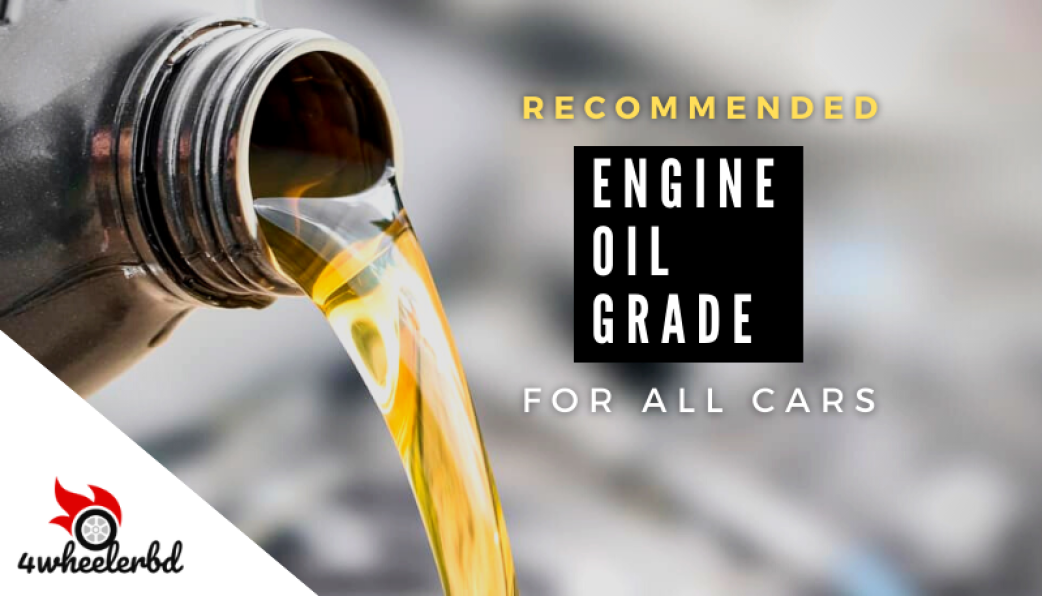One of the most essential things used in a car is engine oil. Using the right engine oil with the right grade plays a vital role in improving the performance and the lifespan of your vehicle’s engine. Engine oil has four functions: lubrication, protection, cooling, and cleaning. In other words: performance, longevity, durability, and emissions. The fuel economy can also vary largely due to it. It is also very important to note that, not all engine oils function or operate the same way, so not knowing the right grade of lubricant you are using could be fatal for your engine. It is best to follow the instructions given by the car manufacturer, as these recommendations are based on some parameters of your vehicle.
BUY ENGINE OIL ONLINE – www.vovopip.com |
Different cars require different oils based on temperature and type of car. Most modern engines often require lighter oil. An older, classic car needs thicker mineral oils. Essentially, you need to use oil that is the recommended viscosity. Find the recommended engine oil grade for all the leading car brands in Bangladesh.
Toyota
Toyota cars have specific types of oils that work better with their engines than other cars. It is important to use the proper type of motor oil with your Toyota. At this point, all modern Toyota models at least recommend synthetic oil, and more and more are requiring it. As it provides more protection to the engine in cold weather or when the engine hasn’t been started in a long time. It is more durable than standard motor oils and costs slightly more. It prevents “sludging” problems, which have plagued a number of Toyota vehicle models. There are several brands of synthetic oils, and most work well with all models of Toyota automobiles. Motor oil grade 5W-30 is recommended for all Toyota engines. It has a higher viscosity to properly coat four and six-cylinder engines. Toyota recommends using only International Lubricant Standardization and Approval Committee-certified 5W-30 engine oil. If you do not have access to 5W-30 oil, you can use 10W-30 oil, but Toyota recommends switching back to 5W-30 on the next oil change. Toyota recommends changing this oil type every 3,000 miles.
Honda
Honda engines are developed, tested, and certified with petroleum-based motor oils as a lubricant. Synthetic oils may be used; however, any motor oil used in our engines must meet all oil requirements as stated in the owner’s manual.
Make sure you are following the rating specified by the manufacturer. E.g., if the rating says 10W-40, regardless of the brand, buy engine oil with the same rating. The most latest models, modern Hondas use fuel-efficient 0W-20 or 5W-20 (full synthetic) or 5W-20 dino oil. For the i-CDTi and i-DTEC diesel engines, the recommended oil for Western European driving conditions and weather conditions is fully synthetic motor oil meeting the minimum specification ACEA C2/C3. The recommended viscosity is 0W-30. For all petrol engines, excluding Hybrid models, the recommended oil for Western European driving conditions and weather conditions is a semi-synthetic motor oil meeting the minimum specification ACEA A1/B1. The recommended viscosity range is between 0W-20 to 10W-40. A unique Hybrid Green Oil has been developed by Honda for Hybrid engines. This new oil not only improves the performance characteristics in all driving conditions but also has the additional advantages of not only improved fuel economy, being environmentally friendly, and is the first oil developed specifically for Hybrid engines. To get the best performance from the engine, change the oil a little earlier than when it is due.
Audi
Engine oil is manufactured in different viscosities to meet the requirements of various engines. The correct viscosity grade
for your engine depends on the type of fuel used, engine design, and climatic or seasonal conditions where you drive. For gasoline engines, you can use oil with a viscosity of SAE 5W-40 across all temperature ranges for normal driving conditions. However, if that grade is not available, you can use 5W-30 or an alternate viscosity grade as long as it meets the proper Audi oil-quality standard. For Diesel engines use SAE 5W-30. For the R8 GT and 2014+ R8 V10 use only SAE 10W-60. Because Audi-approved engine oil may not be available everywhere, we recommend that you always carry an extra quart (liter) with you. Audi recommends checking the engine oil level at every fill-up, and always before a long trip. See your dealer or reference your Audi Owner’s Manual for the proper procedure to check the oil level.
BMW
The BMW is a marvel of German engineering and its engine parts have been designed using unique metal alloys with very strict tolerances. Many of the complex systems within a BMW engine, most notably the infamous hydraulic lifters, must be lubricated with the BMW-approved oil in order to operate correctly. 5W-30 is the motor oil that it uses for the cars that were designed and manufactured after 2002. Most BMW engine comes with a 5W-30 from the factory. BMW also recommends an oil change interval of 15,000 miles. An oil with the 0W-40 specification is designed to operate over a wider ambient temperature range than a 0W-30 oil. And a 10W-40 specification would normally be recommended in warmer operating conditions than a 0W-30 oil. Keep climate into consideration, If you’re in warmer climates, people often elect for the 5W-40 oil type. If you’re in colder climates, then opt-in for the 0W-40 oil type. 0W-40 lubricates the bearings better at startup vs. 5W-40 which takes a few minutes to warm up to optimal lubricating temperature.
Hyundai
synthetic 5W-30 should be more than adequate for Hyundai cars. Each car engine is designed to use a specific weight oil, which is often listed in the owner’s manual or on the engine oil cap. Common types include 0W20, 10W40 and 5W30. Synthetic oil is the best. It cost a bit more but you don’t have to change it as often. If you live in a warm climate, 10W40 is good but If you live in a cold climate, 5W30 is required.
Lexus
The Lexus brand is owned by Toyota, so most new Lexus models require Toyota Genuine Motor Oil SAE 0W-20, which is synthetic motor oil. Older models may require the conventional Toyota Genuine Motor Oil 5W-30. The synthetic motor oil has been custom designed to increase fuel economy, help start the engine more readily in cold weather, and to last longer. We recommend that Geneva drivers get a Lexus oil change every 10,000 miles for new models. For conventional oil vehicles, every 5,000 miles is recommended. Older vehicles may require more frequent oil changes.
Mazda
Mazda recommends using an SAE 0W-20 oil — which is available as a full synthetic or as a blend. For the most part, almost all Mazda cars and crossover SUVs will call for SAE 0W-20 oil. The best advice we can give people is to check your Mazda vehicle’s owner’s manual and follow the maintenance recommendations printed there. However, using the recommended oil will get you the best performance, especially if you’re somewhere with extreme heat or cold climates.
Mercedes-Benz
Mercedes-Benz is a luxury car maker known for producing automobiles that combine style and excellent design with technology and performance. If you own a Mercedes, providing regular maintenance is key for optimum performance. Getting regular oil changes is a fundamental step in keeping your Mercedes performing at a high level, but you must know the proper oil to use. You need to know the correct oil weight, as well as the proper grade. Mercedes-Benz offers both 5W-30 and 10W-40 oil grades. A lower viscosity oil, such as 10W-40, is designed for older engines and operates in a smaller temperature range. 5W-30 is a multigrade oil designed for newer vehicles with broader ambient temperature requirements. Multi-viscosity oil of 5W-40 weight is recommended for most models, though 0W-30, 0W-40, 10W-40, and 5W-30 are also used in certain cars. Engine oils reduce mechanical friction between fixed and moving engine components. Exceptionally high levels of friction and pressure build up inside the engine compartment, and the combustion process generates extremely high temperatures.
Nissan
Nissan always recommends using 5W-30 since it’s best for efficiency and optimal performance. Nissan recommends changing the oil if you choose the fully synthetic 5W-30 every 10,000KM or every 6 months and if you choose the mineral-based 20W-50 then every 5000KM or every 3 months.
Suzuki
SAE 5W-30 synthetic engine oil variant (API rating of SG+) was unveiled as the recommended oil for most Suzuki cars, such as the Grand Vitara, Swift, and Celerio.
Engine oils come in different grades as mentioned above. The grades are determined on the basis of their viscosities. The viscosity of an oil is measured by its resistance to flow. Different engine oils have different viscosities at room temperature and they also react differently to temperature changes. So, selecting the right grade largely depends on your geographical location and the climate of the area you are driving in. The general rule that one must follow since Bangladesh is typically a warm place to drive in, is to use a slightly thicker grade of oil such as a 10W-30, especially for older engines. For a newer one, you’d be better off with a synthetic 5W-30 which is a multi-grade oil for use in both low starting temperatures as well as high summer temperatures. It is wise to invest in a good lubricant rather than waste time and money at a workshop. Having sound good knowledge on the matter will ensure easier maintenance and longevity of your precious vehicle.

